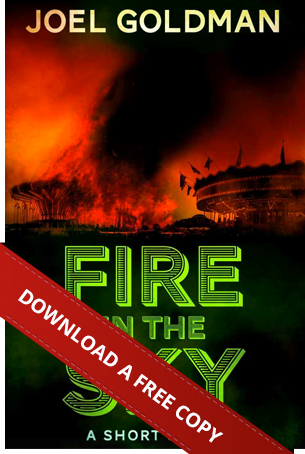The Writer’s Life – elements of craft
The Writer’s Life, an ongoing discussion with crime novelist, Joel Goldman, about the writing craft. How does he take a concept and turn it into a finished novel with twists, turns, and blood-curdling suspense? In this episode, Joel gives us window into his writing process.
Transcript – elements of craft
Interviewer:
Welcome to the Writer’s Life, an ongoing discussion with crime novelist, Joel Goldman, about the writing craft. As avid readers of Joel’s novels, we get to experience the published masterpieces. How does he take a concept and turn it into a finished novel with twists, turns, and blood-curdling suspense? In this episode, Joel gives us window into his writing process.
Joel, it’s great to be with you. Was crime fiction something you decided to write because you were a lawyer or simply because you had a particular interest in that genre? How did you choose?
Joel:
All fiction, really, is an exploration of humanity. It’s an exploration of our strengths and weaknesses, how we deal with conflict, how we deal with success, how we deal with life. Crime fiction raises the stakes. That is interesting to me, to see how people deal with that sort of thing. Violence is a necessary part of crime fiction. For me, the question about violence is how the characters respond to the violence. It isn’t about a page or more of blood, guts, gore, and mayhem, which can be exciting and thrilling on its own and work really well for some writers. For me, I’m much more interested in how all of that impacts the characters.
We live in a dangerous world. You never know what’s going to happen to people you know, people you love; who’s going to be the next victim of a crime. I don’t want to raise that to the level of paranoia, but we do live in an uncertain world and things don’t always work out. Not every crime is solved, not every perpetrator is brought to justice, but the one thing that you can do in crime fiction is you can take a reader into that world and they can experience that world safely and vicariously, and they can have the satisfaction that there’s accountability at the end; that the bad guy is held to account. Crime fiction, I think, appeals to our concerns about our own safety in the real world, and it’s a place for us to go where it is going to be safe.
Interviewer:
You say all of your books proceed from the question, ‘What happens when things go wrong?’ Elaborate on that if you would.
Joel:
A book where nothing goes wrong, a story where there is no tension, no drama, no tragedy, where all the characters are beautiful, wonderful people, they’re fabulously rich, they’re healthy, they’re well-adjusted, they do not have a crossword to say about anyone, and they have not a care in the world; nobody cares about that. People get engaged and they care about drama. Look at the Bible, Garden of Eden. Adam and Eve having a wonderful time, life could not be any better, until the apple. After that, it’s a lot more interesting.
Challenging the characters as to how they respond when things go wrong is what really drives the character development and drives the story. If there’s no conflict, there’s no story; there’s not a story worth telling or reading. My job as the writer is to create that conflict and give the characters the opportunity to deal with it.
Interviewer:
Let’s talk a little bit about the plot of your novels because they’re fascinating, they’re complicated, they have a lot of twists and turns. I’m wondering how you come up with the plots and whether you outline them at the outset or whether they just come to you as you go along.
Joel:
When I first starting writing, I thought I would use the same tools as I did when I was getting ready for trial, and that meant an outline of everything that was going to happen. A lot of writers do that, so they know before they write the first page, all those details: Who the bad guy is, how it’s going to end, and all the motivations. That didn’t work for me. It was a straitjacket. I couldn’t make it work. I start with where I think I’m going and I find out if I’m going to get there at the end. From a plot standpoint, things happen to my characters and in my stories that I never thought about at the beginning of the book. As I get to know how the characters are interacting and as I have more time to think about the storm that I’ve given birth to, then I see other ways in which the story can go.
Everything in the book, every word, every sentence, every paragraph has to advance either plot, character, or both. Otherwise, it’s gratuitous, it doesn’t serve any purpose, and it needs to go. No matter how wonderfully written I might think that it is, it has to go.
Interviewer:
It sounds like you’re pretty ruthless about self-editing.
Joel:
I am now. When I first started writing, I wasn’t because I didn’t know how to do it. I didn’t know what it was. When I first learned how to be a good critical self-editor, I discovered that the word ‘seems’ was my favorite word in the entire English language. There was no word I liked better; terrible word. It’s a weak word. It says you’re not sure. Maybe you need . . . ambiguity has its place, but you ought to be more sure than you are unsure.
What I was saying to the reader and what I was saying about myself is I really wasn’t sure what the hell I was doing. Mechanically, I became much more attuned to repetitive word use; the same word in the same sentence or the same paragraph, or in paragraphs close together, when it’s a descriptive word, a word that has impact, not a word that is a conjunction or something like that, but a word that has to stand out. It’s like hand-to-hand combat, me and the words, one word at a time. I have to be able to justify the presence of each word on the page, not just on the page, but where it is on the page. If I feel comfortable about that, then I’ve done a good job.
Then the other challenge is being seduced by my own brilliance. In other words, I can’t imagine anybody . . . who could’ve written something that fabulous, that beautiful, that meaningful, that ironic, that punchy? You know what; it doesn’t work and it’s got to go. You have to be ruthless about it. As brilliant as I may be, it could still be brilliant, it just doesn’t work.
Interviewer:
Would it be more accurate to say that you write for a living or that you live to write?
Joel:
They’re both true, because I can’t imagine not writing. I just can’t. I’m happiest when I’m writing, when I’m just working the keyboard and watching things popup on the screen, and I have one of those magical moments when I sit back and I say, “Wow. That’s great. Man, I never saw that coming. I really love the way that that sets up or works out.” Those moments are . . . those are gifts. I love the process, the creative process for me I live to do. I live to do that. Since I have to eat, my wife has to eat, my dogs have to eat, and my kids want birthday presents, I write for a living.
Interviewer:
Joel Goldman is an international best-selling crime author. His characters Lou Mason, Jack Davidson, and Alex Stone wrestle with challenges the rest of us would run away from. Get to know these characters and you’ll want to come back for more. Thanks for joining us for the installment of the Writer’s Life. Additional videos about Joel’s life and work are available on JoelGoldman.com.



